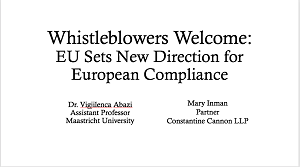Whistleblowers Welcome – Mary Inman Speaks at SCCE’s Virtual Conference for European Compliance Professionals

On April 21, 2020, Constantine Cannon partner Mary Inman spoke at the European Compliance and Ethics Institute (ECEI), a virtual conference organized by the Society of Corporate Compliance and Ethics (SCCE), on the opportunities presented to European compliance officers by the 2019 EU Whistleblower Directive, including its requirement that companies create internal reporting mechanisms to facilitate whistleblowers’ ability to speak up and report concerns and combat the corporate culture of silence. Her talk expanded on her interview on the November 2019 SCCE Compliance Perspectives podcast hosted by Adam Turtletaub. Earlier this year, Mary and the whistleblowing team at Constantine Cannon’s London office prepared a comprehensive guide for the European Federation of Journalists on the new EU Whistleblower Directive, which she presented at the European Parliament. For the SCCE event, which gathers Europe’s leading compliance professionals, Mary partnered with co-panelist Dr. Vigjilenca Abazi of Maastricht University, a leading expert on the EU Whistleblower Directive. With this dual perspective of whistleblower practitioner and academic, Mary and Dr. Abazi were able to provide a more complete picture of the opportunities the Directive presents for European businesses, challenging attendees to embrace one of its central tenets; i.e., that whistleblowers should be viewed as assets, not liabilities, to their organizations and early detectors of risk.
While the EU Directive’s requirement that public and private companies adopt internal reporting mechanisms is new to the EU on the whole, such mechanisms have been mandatory at the national level in several countries such as the US, UK, and France for some time. Where previously there had been a patchwork quilt of regulation, the Directive provides a uniform standard of whistleblower protection across the EU and expands the definition of “whistleblower” to afford protections to prospective and former employees as well as whistleblowers’ family members and businesses. Mary and Dr. Abazi emphasized that because the Directive serves as a floor rather than a ceiling, individual member states are free to go beyond the Directive’s minimum requirements in the transposition process and impose greater protections and devise expanded roles for whistleblowers.
To bolster the contention that whistleblowers are assets to corporations, Mary discussed new empirical research from Professors Kyle Welch of George Washington University and Stephen Stubbens of the University of Utah, finding that companies with active internal reporting mechanisms, i.e., hotlines that employees used regularly to make reports, were more profitable and the subject of fewer lawsuits and fines than those companies whose hotlines were silent/unused. In addition to the Whistleblower Directive, Mary also discussed Article 5 of the Trade Secrets Directive, which seeks to shield whistleblowers from trade secret liability if they are making disclosures of wrongdoing that are in the public interest.
Constantine Cannon is proud to represent both domestic and international whistleblowers and looks forward to future collaborations with Dr. Abazi as the role of whistleblowers continues to expand globally.
Read More:
- The Constantine Cannon Whistleblower Team
- I Think I Have a Whistleblower Case
- Whistleblower FAQs
- International Whistleblowers
Tagged in: CC Lawyers, Importance of Whistleblowers, International Whistleblowers,